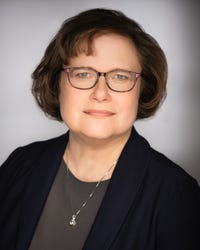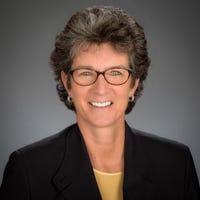Stericycle's Leading Women Talk Investor Confidence, Operations
There’s a corporate trend gaining traction: seasoned women making their way into C-suite positions. A few of these senior executives run historically male-dominated solid waste operations. Medical waste management company Stericycle is among that minority, with females as CEO and CFO. The multibillion-dollar corporation is actually one of only six companies of any kind that’s on the S&P 500 who have women in both of these power positions.

There’s a corporate trend gaining traction: seasoned women making their way into C-suite positions. A few of these senior executives run historically male-dominated solid waste operations.
Medical waste management company Stericycle is among that minority, with females as CEO and CFO. The multibillion-dollar corporation is actually one of only six companies of any kind that’s on the S&P 500 who have women in both of these power positions.
Stericycle CEO Cindy J. Miller and CFO and CIO Janet Zelenka highlight colorful moments from their past and present. They speak candidly about gaining investor confidence. And they take us inside operations for a glimpse of what they call a strategy to “disrupt and transform” the company to prepare for the future.
Miller got her start as a UPS delivery driver, working her way up through operations, into management, to president of UPS Europe. Next, she ran the freight forwarding division, which moves bulk cargo around the world.
“But I wanted a chance to do more. And I wanted to be in the C-suite,” she says.
She joined Stericycle as its COO in October 2018, moving seven months later into her current role, becoming the first female CEO of a publicly traded waste company. The 30-year logistics veteran had her work cut out for her.
“I already had an understanding of logistics. And I understood the commercial components of the job, like price setting, marketing, engagement with customers, and value propositions.”
She also spent years dealing with an international workforce, as well as markets and policies from around the world.
“There were different countries, different rules, different regulations. And here I am at Stericycle where we operate in North America and 17 countries elsewhere.”
She understood not just the varied regulations but what she calls “the human aspect involving global management of people. It’s the cross of managing people of different cultures, statuses, etc., while maintaining a cohesive management style and workplace culture across the organization,” Miller says.
Working with lead Zelenka, she’s focusing on an undertaking intended to better prepare the company for its future in the corporate world. A digital technology transformation to help centralize processes and standardize procedures.
When Miller and Zelenka came on board there were over 400 acquisitions that operated autonomously. Most of the businesses ran processes as they had before that needed to be standardized, from commercial (order to disposal), to accounting and human capital, among them.
“So, we were looking to make a standardization transformation. Let’s take these 400 acquisitions with tremendous value and bring them into a more corporate structure to gain more synergies to move into the next decade as a more streamlined, more focused, more efficient company,” Miller says
Zelenka, at the helm through this project, is implementing an enterprise resource planning (ERP) system to integrate management of core business processes. The ERP not only helps to standardize and centralize processes and data but helps achieve long-term outlook, Zelenka says.
Among capabilities, the company now has daily reporting at multiple levels (from continent down to individual facility) and standardized routing through technology that integrates into one customer relations management tool.
Being able to leverage metrics and gauge outcomes, down to one facility, has especially been instrumental in her eyes.
“We historically had to wait almost 15 days after month end to understand performance results at an aggregated geographic level. Facility-level metrics allow me to compare and contrast performance to help further standardize the operating model with central oversight that drives business performance.”
For Zelenka, wearing both CIO and CFO hats means stepping into multiple territories beyond facilitating IT projects like ERP. She leads corporate functions such as implementing debt and divestiture and merger and acquisition strategies.
Her two executive-level jobs work well together in her eyes.
“There is synergy between advancing IT strategy and advancing business and finance strategy, as business and finance are dependent on technology. For example, IT (hardware, software, and networking infrastructure) and digital technology (how IT is used) are increasingly critical both for protection from cyberattacks and advancing companies’ [business] capabilities. And of course the IT story is a big part of the [corporate] transformation we are working on.”
Zelenka joined Stericycle in 2019, after working the same dual leadership positions for a Fortune 500 company, Essendant, later bought by Staples.
Her first day on the job is still clear in her mind.
“I had two hours of orientation, then got on a plane with three other women leaders. We were going to Wall Street to advocate for $600 million of public bond offering to rebalance Stericycle’s debt. I had to stand before these investors and gain their confidence,” Zelenka says.
How did she approach this first charge as a new hire?
“For me it’s about being forthright. This is what I know about Stericycle today …this is what I don’t know yet. But this is how I think about the issues. And this is my background.”
In those early days and today what’s key, she says, is building trust and credibility.
“You accomplish this by being straightforward and transparent. You write and communicate a story about the company and where we are going,” she says.
Both of Zelenka’s chosen professions remain male dominated.
“IT is more so, though this is beginning to change. There are more women coming on board as CFOs, though they are still a minority. It’s interesting to watch both professions grow their recognition of diversity,” she says.
Zelenka serves on two boards providing financial and IT expertise. She observes there, too, a growing awareness of lack of diversity and a push to recruit more women. And she notices more women trying to make this entry, a shift she’s happy to see, commenting diversity brings more perspectives.
“You have to [make] change not only at the front line all the way up to the C-suite, but also into the board of directors. That’s the full chain. The seas of change need to happen at every level.”
Miller too is no stranger to working mainly with men. She doesn’t think so much about gender differences. What matters is diversity in thought, whether those thoughts are women’s or men’s.
“I think [having diversity of thought] is the value in making great strategic decisions to prepare yourself as an individual, or your company for tomorrow.
I do not always seek advice from people that think just like me because I already know what I think. Looking from different angles is what helps me improve personally and make better decisions at the board table,” she says.
Her message to other women: keep aspiring to be whatever they want to be; go with their unique voice; and don’t feel compelled to fall into the “female view” or any other view.
“It’s what are you bringing as an individual? That’s the true value of unlocking diversity,” Miller says.
She talks about the front line, pausing on the trucking piece of the business, including her own connection to it.
“Having started as a truck driver in 1988, I am at home with drivers and plant workers. When I hear engines and smell diesel it takes me immediately to the place where I started and spent a good bit of my career learning.”
Engaging with front-line workers and understanding their job is key to figuring out how to direct a company to its future, she says.
“They are out engaging with customers every day. They understand what’s going on and know what’s happening immediately rather than have to wait for information to come in a report.”
Speaking more holistically of the company she leads and its people, she says Stericycle protects what matters.
“If you think about it, medical waste comes out of hospital operating rooms and other points of patient care. It could be infectious or cause damage to the environment. We wake up every day with a purpose knowing what we do is so important to keeping the health care network up and running safely and effectively. We take that very seriously. Very pridefully.”

CIO Janet Zelenka Credit: Stericycle

CEO Cindy J Miller Credit: Stericycle
About the Author
You May Also Like




